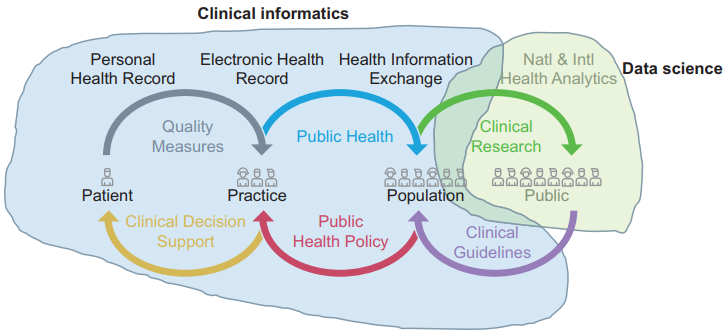Difference between revisions of "Template:Article of the week"
Shawndouglas (talk | contribs) (Updated article of the week text.) |
Shawndouglas (talk | contribs) (Updated article of the week text) |
||
| Line 1: | Line 1: | ||
'''"[[Journal: | <div style="float: left; margin: 0.5em 0.9em 0.4em 0em;">[[File:Fig2 Scott JofInnoHlthInfo2018 25-2.png|240px]]</div> | ||
'''"[[Journal:Learning health systems need to bridge the "two cultures" of clinical informatics and data science|Learning health systems need to bridge the "two cultures" of clinical informatics and data science]]"''' | |||
United Kingdom (U.K.) health research policy and plans for population health management are predicated upon transformative knowledge discovery from operational "big data." Learning health systems require not only data but also feedback loops of knowledge into changed practice. This depends on [[Information management|knowledge management]] and application, which in turn depends upon effective system design and implementation. [[Health informatics|Biomedical informatics]] is the interdisciplinary field at the intersection of health science, social science, and information science and technology that spans this entire scope. | |||
In the U.K., the separate worlds of health data science ([[bioinformatics]], big data) and effective healthcare system design and implementation ([[Health informatics#Clinical informatics|clinical informatics]], "digital health") have operated as "two cultures." Much National Health Service and social care data is of very poor quality. Substantial research funding is wasted on data cleansing or by producing very weak evidence. There is not yet a sufficiently powerful professional community or evidence base of best practice to influence the practitioner community or the digital health industry. ('''[[Journal:Learning health systems need to bridge the "two cultures" of clinical informatics and data science|Full article...]]''')<br /> | |||
<br /> | <br /> | ||
''Recently featured'': | ''Recently featured'': | ||
: ▪ [[Journal:The problem with dates: Applying ISO 8601 to research data management|The problem with dates: Applying ISO 8601 to research data management]] | |||
: ▪ [[Journal:Health sciences libraries advancing collaborative clinical research data management in universities|Health sciences libraries advancing collaborative clinical research data management in universities]] | : ▪ [[Journal:Health sciences libraries advancing collaborative clinical research data management in universities|Health sciences libraries advancing collaborative clinical research data management in universities]] | ||
: ▪ [[Journal:Privacy preservation techniques in big data analytics: A survey|Privacy preservation techniques in big data analytics: A survey]] | : ▪ [[Journal:Privacy preservation techniques in big data analytics: A survey|Privacy preservation techniques in big data analytics: A survey]] | ||
Revision as of 19:36, 28 January 2019
"Learning health systems need to bridge the "two cultures" of clinical informatics and data science"
United Kingdom (U.K.) health research policy and plans for population health management are predicated upon transformative knowledge discovery from operational "big data." Learning health systems require not only data but also feedback loops of knowledge into changed practice. This depends on knowledge management and application, which in turn depends upon effective system design and implementation. Biomedical informatics is the interdisciplinary field at the intersection of health science, social science, and information science and technology that spans this entire scope.
In the U.K., the separate worlds of health data science (bioinformatics, big data) and effective healthcare system design and implementation (clinical informatics, "digital health") have operated as "two cultures." Much National Health Service and social care data is of very poor quality. Substantial research funding is wasted on data cleansing or by producing very weak evidence. There is not yet a sufficiently powerful professional community or evidence base of best practice to influence the practitioner community or the digital health industry. (Full article...)
Recently featured:










